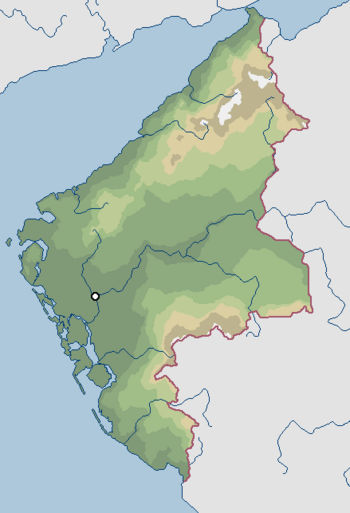Amaria: Difference between revisions
mNo edit summary |
No edit summary |
||
| Line 37: | Line 37: | ||
|established_event2 = <!--First key event in history of country/territory's status or formation--> | |established_event2 = <!--First key event in history of country/territory's status or formation--> | ||
|established_date2 = <!--Date of first key event--> | |established_date2 = <!--Date of first key event--> | ||
|area_km2 = | |area_km2 = 2484950 | ||
|area_sqmi = <!--Major area size (in [[Template:convert]] either km2 or sqmi first), you do not need to include a km^2 sort of suffix--> | |area_sqmi = <!--Major area size (in [[Template:convert]] either km2 or sqmi first), you do not need to include a km^2 sort of suffix--> | ||
|population_estimate = 120,369,037 <!--Unofficial count of a national population, often larger than cesus unless events indicating otherwise--> | |population_estimate = 120,369,037 <!--Unofficial count of a national population, often larger than cesus unless events indicating otherwise--> | ||
Latest revision as of 22:09, 22 June 2021
This article is incomplete because it is pending further input from participants, or it is a work-in-progress by one author. Please comment on this article's talk page to share your input, comments and questions. Note: To contribute to this article, you may need to seek help from the author(s) of this page. |
Realm of Amaria 𐤌𐤋𐤊𐤟𐤌𐤄𐤓 Malk Emhar | |
|---|---|
|
Flag | |
 | |
| Capital | Nineve |
| Largest city | Azkart |
| Official languages | Tyrean |
| Ethnic groups (2020) | TBD% Tyrean TBD |
| Demonym(s) | Amari |
| Government | Parliamentary Constitutional monarchy |
• Nin | Elissa III |
| Tabnit ben Ahum | |
| Legislature | Hasher Addirim |
| Area | |
• Total | 2,484,950 km2 (959,440 sq mi) |
| Population | |
• 2021 estimate | 120,369,037 |
• 2020 census | 118,907,504 |
• Density | 121/km2 (313.4/sq mi) |
| GDP (PPP) | 2020 estimate |
• Total | |
• Per capita | $38,109 |
| GDP (nominal) | 2020 estimate |
• Total | |
• Per capita | $24,401 |
| HDI (2020) | 0.881 very high |
| Currency | Shekel (𐤔) (AMS) |
| Date format | DD-MM-YYY AD |
| Driving side | right |
| Internet TLD | .am |
Amaria (Tyrian: 𐤌𐤄𐤓, Emhar), officially the Realm of Amaria (Tyrian: 𐤌𐤋𐤊𐤟𐤌𐤄𐤓, Malk Emhar) , is a country located in northwestern Ased, bordering the Placeholder Sea to the west and the PLaceholder Sea to the north. Nineve is the country’s capital, while Azkart is its largest city and economic center.
Civilization in the lands now located within Amaria traces its heritage to beyond 3000 BCE, with the rise of the Shimu civilization along the [Major River] basin. The Shimu were amongst the first settled people, developing agriculture in the coastal floodplains of the region’s western coast. By 3000 BCE, the Shimu had established various city states around the area, notably Nimrud, one of the first and largest cities of its own time. Government in Nimrud was strictly hierarchized under religious structures in government, who organized society outside and within the city. Multiple different dynasties fought for control of Nimrud initially, with Nin Shem the Great establishing the most successful dynasty, consolidating the region firmly under Nimrud and creating the 1st Dynasty of Nimrud.
Semitic peoples from the east migrated into the land over the 2nd and 1st Millenium, establishing multiple settlements and founding new cities. While it is believed that the groups mixed and coexisted, incorporating cultural and societal elements from another, the growth in political and economic power of semitic cities such as Shur eventually escalated conflicts between the two groups. Following multiple wars and periods of dispute, eventually Shur was firmly the major center of political and economic influence in the region. The conquest of Nimrud in 2100 BC by Adat Arishat of Shur cemented the domination of the region by semitic peoples. The region would remain as such, being home to ancient empires such as the 1st and 2nd Shur Dynasties, the Qadeshite Empire and numerous other polities.
Shur would further rise in 630 BCE with the consolidation of power under the 3rd Shur Dynasty, also known as the Tyrean Empire. The empire quickly grew to be a major maritime power in its vicinity, consolidating its power and dominance in trade along the Placeaholder sea. Tyrea would expand and establish various colonies in Ased, Khanine and Herian. The empire would achieve its peak in 108 AD, declining and stagnating following various invasions and internal dynastic conflicts. It would ultimately collapse into various rump states in 827 AD. Amarian states would find themselves subject to foreign influence and invasion, such as the Placeholder Dynasty in the 11th century and Herian trading posts from the 15th century onwards. The nation would reunify under General Azahar ben Arik in 1783, the founder of modern Amaria.
Amaria is today a Newly industrialized country, considered to be a Regional Power. The nation has achieved rapid economic growth since the 1950s, most notably in the petrochemical sector. Amaria is a world leading producer of petroleum, with one of the largest oil reserves in Ceron. The country is a member state of the Placeholder Organization, Placeholder Organization, LOEN and the UN Placeholder.
